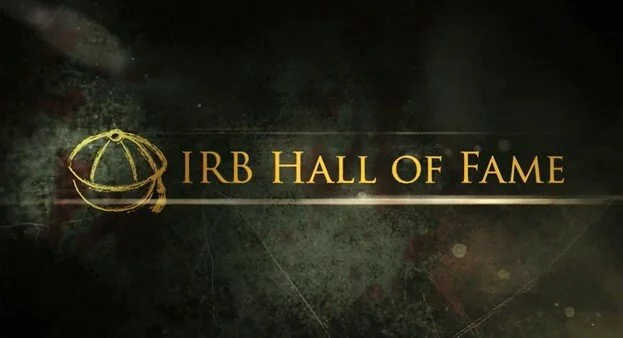Ten legendary All Blacks, and one journalist have been inducted into the Hall Of Fame at a ceremony on Auckland today.
This latest induction represents the incorporation into the IRB Hall of Fame of many of the International Rugby Hall of Fame, which was recently acquired by the IRB and presentations were made by Hall of Fame panel member Don Cameron and New Zealand Rugby chief executive Steve Tew. The new inductees are: Fred Allen, Don Clarke, Grant Fox, Sean Fitzpatrick, Michael Jones, Ian Kirkpatrick, John Kirwan, Terry McLean, Colin Meads, Graham Mourie and George Nepia.

Graham Mourie 
Hailing from Taranaki, Graham Mourie captained his province from flanker and went on to become one of the great All Black captains in the late 1970s and early 1980s. First selected in 1976, he played against the British & Irish Lions in 1977 and captained the side to France later that year.
He played a total of 61 matches for the All Blacks, including 21 Tests, and led the side on the historic Grand Slam tour of Britain and Ireland in 1978.
Sir Terry McLean

A legendary New Zealand sports writer and author who started as a journalist on theAuckland Sun in 1930, Terry McLean became the finest reporter of New Zealand rugby for more than half a century. Together his 32 books tell the story of every incoming tour to New Zealand and many All Black trips overseas.
After his distinguished career as a rugby correspondent and sports editor of the New Zealand Herald, in 1996 McLean became the only New Zealand sports journalist to be knighted for services to sporting journalism.
Grant Fox
A member of the New Zealand team that won the inaugural Rugby World Cup in 1987, Grant Fox made the All Black number 10 jersey his own between 1985 and 1993, playing 46 Tests and scoring 645 points.
Hailing from the Auckland club where he also coached, Fox has gone on to become a recognised and respected rugby broadcaster in New Zealand and overseas. A true pioneer of modern kicking, he is still regarded as one of the finest goal-kickers of all time.
Sir Fred Allen 
First selected as an All Black in 1946, Fred Allen was named captain every time he wore the famous jersey, including on the tour to South Africa in 1949 when the Springboks won the series 4-0.
Allen coached Auckland successfully during the 1950s and was an All Blacks selector before becoming All Blacks coach in 1966, earning a 100 per cent record with 14 wins out of 14 Tests.
Sir John Kirwan 
A hulking wing in both union and league, John Kirwan is best known for his playing exploits for Auckland and the All Blacks, for whom he scored 35 tries in 63 Tests and won the inaugural Rugby World Cup in 1987.
In a playing career that also took him across the world to Europe and Japan, Kirwan made 96 appearances in total as an All Black between 1984 and 1994 and played a key role in the team’s 23-Test unbeaten run from 1987 to 1990. His 67 tries in total for the All Blacks remains a New Zealand record, as does his total of 199 first-class tries.
Having started coaching in 2001 as an assistant with the Auckland Blues, Kirwan moved to Italy in 2002 to become coach of the national team. In 2007, his coaching education was taken a step further when he was appointed Japan coach, leading them to two Rugby World Cups before returning to his roots in Auckland with the Blues.
Ian Kirkpatrick 
Hailing from Gisbourne and playing first for Poverty Bay, Ian Kirkpatrick moved to Christchurch and established himself in the Canterbury team, scoring 115 tries in 289 first-class games, one of the few forwards to reach a century of tries.
Having made his All Black debut against France in Paris in November 1967, Kirkpatrick played in 39 Tests over 10 years, captaining his country nine times between 1972 and 1974. His 16 tries stood as a national record until Stu Wilson surpassed the figure in 1983.
Michael Jones 
Michael Jones was an integral part of the successful Auckland and Auckland Blues teams which dominated the late 1980s and ’90s, but it was as an openside flanker in the Test arena where he won global acclaim.
Having made his international debut for Samoa in 1986, he played for New Zealand from 1987. He made his Test debut for the All Blacks in the opening match of Rugby World Cup 1987 and was the first player to score a try in that victorious campaign. He amassed 55 caps and would have had many more, but for a cruel run of injuries and strong Christian beliefs which meant he refused to play on a Sunday.
Jones coached Samoa at RWC 2007 in France and four years later fulfilled the role of Volunteer Ambassador for the tournament in New Zealand. He remains a positive role model in the country, particularly for Pacific Island youth in New Zealand.
Sean Fitzpatrick 
A product of a powerful Auckland provincial side, Sean Fitzpatrick made his All Blacks debut in France in 1986, helping a young side to victory and quickly forging a reputation. He started as second choice hooker behind captain Andy Dalton at Rugby World Cup 1987, but played after Dalton’s injury and kept his place to the inaugural tournament.
In 1992, he was appointed All Black captain, a position he held until his retirement from Test rugby in 1997. Fitzpatrick led New Zealand to a first ever series victory over the Springboks in South Africa in 1996. He played 92 Tests – 69 of them as captain – for the All Blacks, a record until overtaken by Richie McCaw and Mils Muliaina in November 2010.
His enduring success in the domestic game with Auckland and the Auckland Blues cemented Fitzpatrick’s status as an icon of New Zealand rugby.
Don Clarke 
First selected to play at the age of 17 in 1951, Don Clarke became a Waikato great and in 1956 helped his province to a 14-10 victory over the touring Springboks.
Clarke was first selected as an All Black for the third Test of that tour and went on to play 89 times for New Zealand, including 31 Test matches, between 1956 and 1964. Revered for his goal-kicking, he earned the nickname ‘the Boot’, scoring 781 points, a record for 24 years until broken by Grant Fox in 1988.
George Nepia 
George Nepia was first selected for the Hawke’s Bay provincial team in 1922, aged 17. After excelling on the wing and at centre, he was selected two years later as a full back for the All Blacks’ unbeaten ‘Invincibles’ tour to the United Kingdom and Ireland. The leader of the haka, he played in all 32 matches – the only player to do so – and scored 77 points.
In 1935 Nepia switched codes to play rugby league in England and back home after his return two years later. In 1947 he returned to union and, when he played a first-class match in 1950 against a Poverty Bay side captained by his eldest son, he became the oldest New Zealander to play in a first-class game.
He is remembered as an exceptional full back and one of the most famous Maori rugby players of all time.
Sir Colin Meads 
Widely considered one of the greatest players in the history of the game, Colin ‘Pinetree’ Meads is a true icon of New Zealand and world rugby.
Meads played his first game for King Country in 1955 at the age of 19 and made his Test debut in Australia two years later, quickly becoming an automatic All Black selection.
In an All Black career spanning 14 years he played 133 matches, 55 of them Tests. He captained his country for the first time in 1960 and for the last time on the occasion of his final Test in 1971.
Meads was named the country’s Player of the Century at the NZRFU Awards in 1999.

